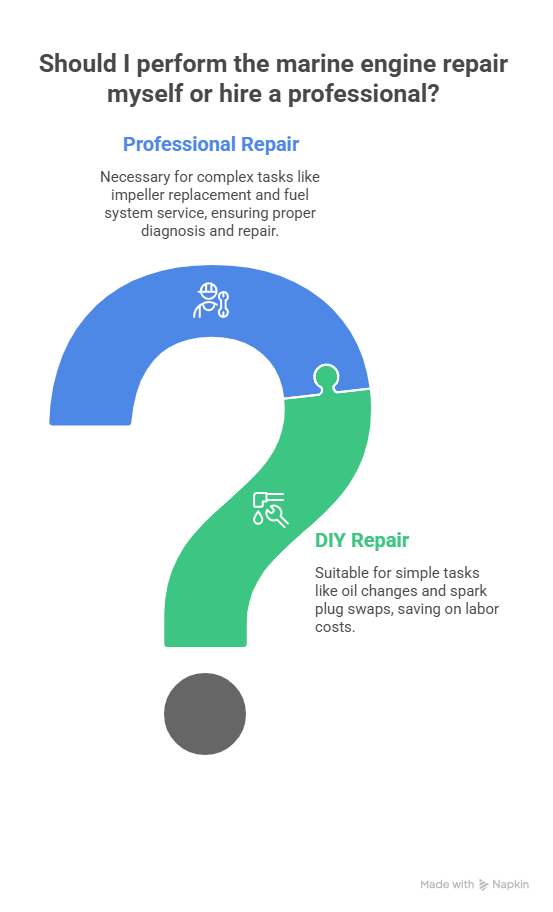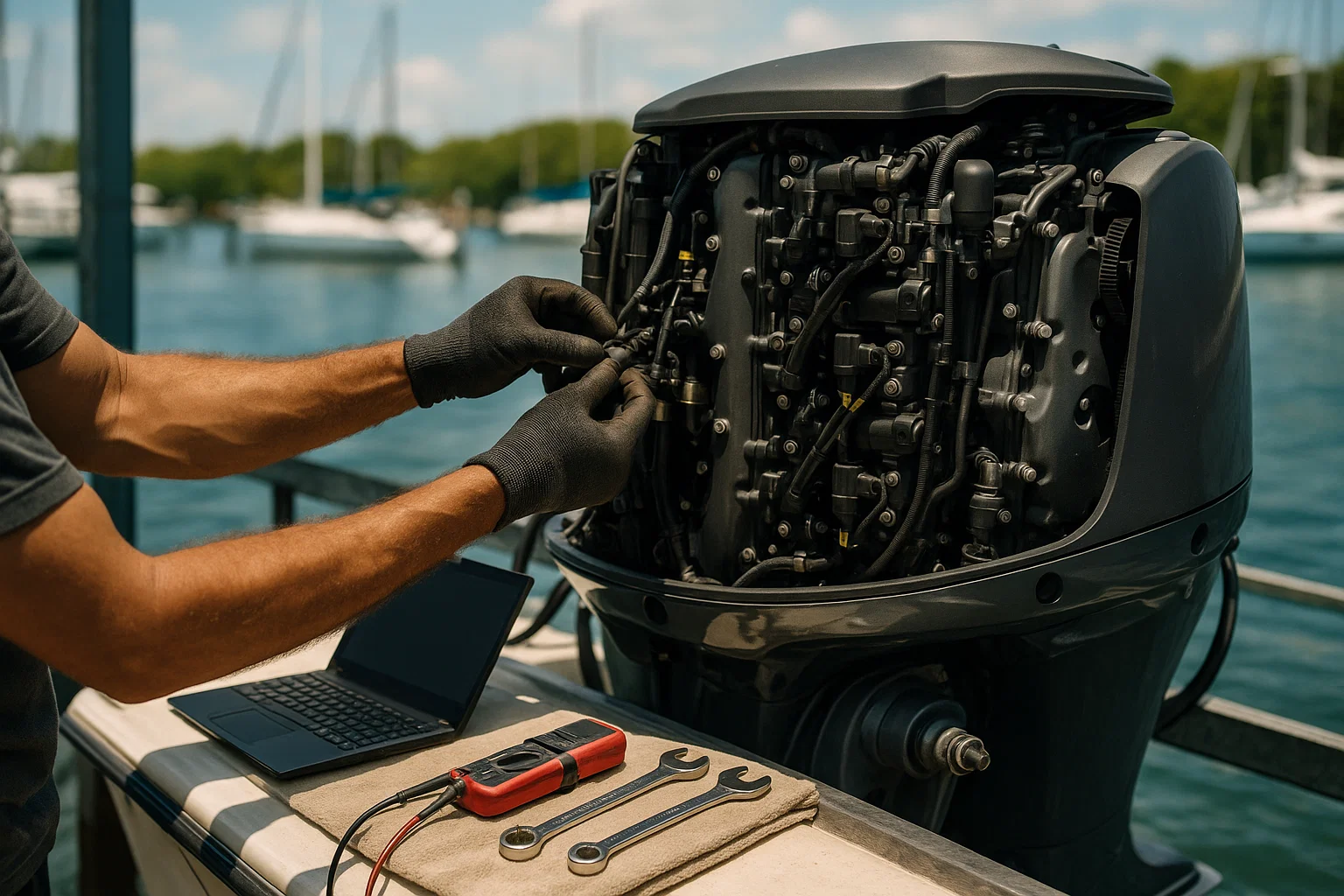“It Just Died.” The Four Words I Hear Every Saturday
Last Saturday, a call comes in. Javier’s Sea Ray, dead in the water off Stiltsville. He’s got family on board, the sun’s beating down, and his day is shot. “It just died,” he tells me. That’s the classic opening line to a story I hear every single weekend here in Miami. A perfect day on the water, ruined by a rebellious marine engine outboard.
For boat owners, a problematic engine isn’t just a mechanical issue; it’s a thief. It steals your time, your money, and your peace of mind. You bought a boat for the freedom, the fishing, the sunsets—not to sit there drifting, waiting for a tow.
That’s where a guy like me comes in. My job isn’t just fixing what’s broken. It’s about getting you back your confidence in your equipment. It’s about making sure that when you turn the key, that marine engine outboard roars to life every single time. This guide is my brain dump on how to keep your engine happy, what to do when it’s not, and how to spot a good mechanic from a parts-changer.
Table of Contents
What Your Marine Engine Outboard is Trying to Tell You
Engines rarely die without warning. They whisper before they scream. Down here in Florida, a marine engine outboard lives a tough life. Saltwater tries to eat it, humidity corrodes its electronics, and ethanol in the fuel gums up its insides. Learning to listen for those early whispers is the key to avoiding a costly tow.
Pay attention to these signs:
- A new vibration or noise: That’s your engine telling you something’s out of balance or loose.
- Trouble starting: If it takes more than a couple of cranks, your fuel or electrical system is crying for help.
- Loss of power: If you’re pushing the throttle forward and not getting the same old punch, don’t ignore it.
- The check engine light: This sounds obvious, but you’d be surprised how many people I see put a piece of tape over it. Don’t be that guy.
Acting on these little hints early is the difference between a $200 fix at the dock and a $5,000 rebuild.
To DIY or To Call a Pro? My Honest Take
So, you’ve got an issue. The big question is, do you break out the tools or call a shop? Some jobs are perfect for a Saturday afternoon. Others will have you tearing your hair out and making things worse.
I put this table together based on the jobs I see most often. It’s my honest opinion on what a handy owner can tackle versus what should be left to a pro who has the right tools and experience with a modern marine engine outboard.
| Job / Repair | My Take: DIY or Pro? | Average Cost (Pro) | Why I Say That |
|---|---|---|---|
| Oil & Filter Change | DIY | $150 – $300 | Totally doable. Just get the right filter and oil weight. The hardest part is not making a mess. |
| Spark Plug Swap | DIY-ish | $100 – $250 | Simple, but you need a torque wrench. I’ve seen way too many cracked ceramic insulators from over-tightening. |
| Impeller Replacement | Call a Pro | $250 – $500 | It looks easy on YouTube. But dropping the lower unit can be a beast, and if you pinch the housing or miss a bolt, you’re looking at a huge bill. |
| Fuel System Service | Call a Pro | $300 – $1,500+ | Today’s fuel systems are complex. With high-pressure pumps and injectors, you need special tools to diagnose it right. Don’t guess here. |
| Thermostat Change | DIY | $150 – $350 | Usually just a few bolts. Just make sure you get the gasket surface perfectly clean before installing the new one. |
Finding a Mechanic Who Doesn’t Suck
If you decide to call a pro, how do you find a good one? There are a lot of shops out there, but not all of them are created equal. You want a diagnostician, not a parts-changer who just guesses on your dime.
Here’s what I look for:
- Certifications: Are their techs ABYC certified? Are they factory-trained for your specific brand (Yamaha, Mercury, Suzuki)? A certified tech understands the “why” behind a failure.
- The Right Tools: Ask if they have the computer diagnostic software for your marine engine outboard. On any engine made in the last 20 years, it’s impossible to properly diagnose without it.
- Transparency: A good mechanic will explain the problem, show you the failed part, and give you clear options. If they can’t explain it in simple terms, they might not understand it themselves.
A reliable repair starts with a reliable diagnosis. It drives me nuts when I see a bill where a customer paid for three different sensors before the shop found the real problem: a bad ground wire. That’s just lazy.

Why I Don’t Use Junk Parts
A repair is only as good as the parts you use. I’m a firm believer in using genuine OEM (Original Equipment Manufacturer) parts whenever possible. Sure, you might save $20 on an aftermarket impeller, but is it worth it?
Last summer, I had a client with a beautiful Boston Whaler. A different shop had put in a cheap aftermarket impeller during his annual service. It failed 10 miles offshore. The blades broke off, clogged his cooling passages, and he cooked his powerhead. The $20 he “saved” turned into a $1,500 tow and a multi-thousand-dollar repair.
For a critical component on a marine engine outboard, stick with what the factory designed. The peace of mind is worth every extra penny.
FAQ: Questions I Get Asked at the Dock
People are always stopping me at Dinner Key or Bahia Mar with questions. Here are the most common ones.
How often should I really service my marine engine outboard?
The book says every 100 hours or once a year, whichever comes first. Stick to that. Even if you only put 20 hours on it, that year of sitting in the Florida humidity does more harm than you’d think.
Is ethanol-free gas really that important?
Yes, absolutely. Ethanol attracts water and can destroy fuel lines and components in an older marine engine outboard. If you can’t get ethanol-free gas, use a good stabilizer like Sta-Bil Marine or Star Tron with every single fill-up.
What’s the single most common failure you see?
Fuel-related issues, hands down. From water in the gas to clogged injectors or a weak fuel pump. A clean, fresh fuel supply is the lifeblood of a happy engine.
My engine sputtered but then started running fine. Should I worry?
Yes. That’s a classic symptom of a fuel delivery issue or an intermittent electrical problem. It’s a warning sign. Get it checked out before it leaves you stranded for real.
What’s one spare part every boater should have on board?
A spare fuel-water separator filter. If you get a bad tank of gas, being able to swap in a clean filter can be the difference between getting home on your own power or calling for a tow.
The Bottom Line: Trust Your Engine
At the end of the day, keeping your marine engine outboard in top shape isn’t about spending a ton of money. It’s about being smart. It’s about proactive maintenance, listening to your engine, and choosing a good technician when you need one.
A well-maintained marine engine outboard is a reliable partner. It’s the key to enjoying your time on the water without worry. So, do the annual service, use good fuel, and don’t ignore the warning signs. Your future self, enjoying a quiet sunset from the cockpit instead of waiting for a tow, will thank you.
Author Bio
I’m Alex, a 15-year marine technician in South Florida, ABYC-certified, specializing in marine engine outboard repair. From Yamahas and Mercurys to Suzukis and Hondas, I’ve diagnosed and fixed them all at marinas like Dinner Key and Bahia Mar, helping boaters stay on the water and out of the repair shop.


Leave a Reply